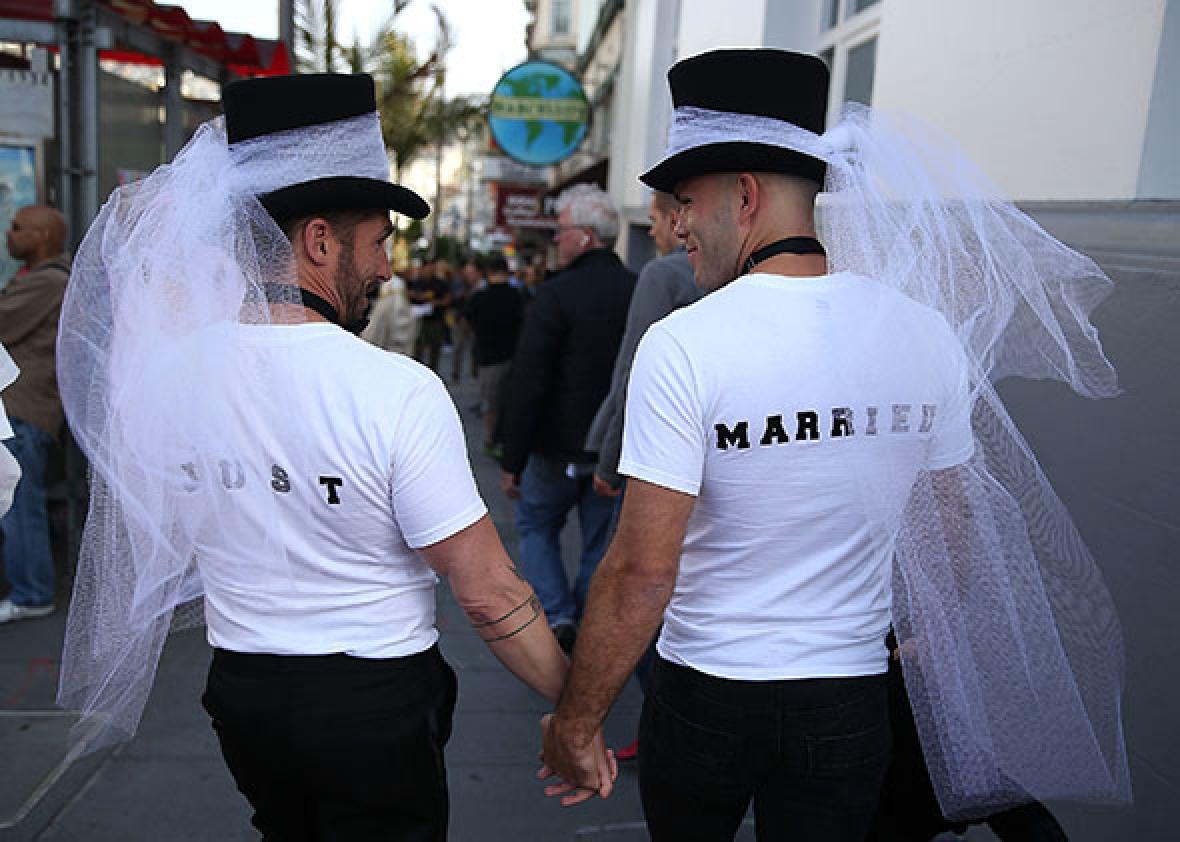Following the landmark Supreme Court decision last week in Obergefell v. Hodges, it quickly became manifest that the soaring poetic language from Justice Anthony Kennedy’s majority opinion would be repurposed by romantics everywhere for use in their own wedding vows.
Reports from around the country indicated that weddings, and most particularly same-sex weddings, were solemnized this past weekend with references to Kennedy’s glorious assertion that “Since the dawn of history, marriage has transformed strangers into relatives, binding families and societies together.”
Well, sure. If you’re a sap. Of course those lines are complete and total gimmes if you’re looking for some standard lush and lovely poetic sentiment. And yet it seems somehow more fitting—and vastly more gratifying—to produce new same-sex marriage vows and rituals based on language from the Obergefell dissents. That is a project both challenging and inclusive.
In addition, possibly the only thing that could be more maddening to Justice Antonin Scalia than losing in Obergefell would be finding out that same-sex couples were getting married while reading selections from his opinion. When you read these dissents with actual happy couples in mind it’s actually not all that hard to find language from the dissenters that might be appropriate for those seeking to really turn those judicial frowns upside down on their big day.
With a bit of artful cutting and pasting, you, yes you, and your beloved can craft an entire ceremony using nothing but language from the naysayers.
So sure, you can go ahead and write up your vows quoting from Kennedy’s lofty avowal that “no union is more profound than marriage, for it embodies the highest ideals of love, fidelity, devotion, sacrifice, and family.” Or you can also be totally subversive and rock selected language from Chief Justice John Roberts’ dissent. For instance, maybe you and your beloved can pledge that “same-sex couples should be allowed to affirm their love and commitment through marriage, just like opposite-sex couples.”
Or offer an opening blessing lifted from Justice Samuel Alito’s very own pen: “… marriage, which focuses almost entirely on the happiness of persons who choose to marry, is shared by many people today.”
Any officiant will bring down the house lifting from Roberts’ “The history of marriage is one of both continuity and change, but the core meaning of marriage has endured.” Or from Alito’s “Marriage provides emotional fulfillment and the promise of support in times of need.”
Let’s agree that at ordinary same-sex marriage ceremonies, everyone will be tempted to quote from that section in the Kennedy opinion that reads: “Marriage responds to the universal fear that a lonely person might call out only to find no one there. It offers the hope of companionship and understanding and assurance that while both still live there will be someone to care for the other.”
But wouldn’t it be vastly more fun to quote Roberts’ pledge “to live only in the heady days of the here and now?” Or maybe the whole ceremony can conclude with the upbeat call from the chief justice to “Celebrate the achievement of a desired goal. Celebrate the opportunity for a new expression of commitment to a partner!”
And, if, say, you find yourself getting married shipboard, perhaps you should cull from Roberts’ memorable turn of phrase, “the winds of change [are] freshening at [your] backs.”
Any officiant seeking a treasure trove of sage advice for the new couple can do no better than Roberts’ “guideposts for responsible decision-making” or “respect flows from the perception—and reality—that we exercise humility and restraint.” You can also cite—Polonius-fashion—Scalia’s “pride, we know, goeth before a fall,” or, “Expression, sure enough, is a freedom, but anyone in a long-lasting marriage will attest that that happy state constricts, rather than expands, what one can prudently say.”
If yours is a call-and-response kind of ceremony, you might consider printing up small notecards that allow guests to bellow “Really?” and “Huh?” and “What Say?” and “I could go on!” at intervals throughout the festivities.
Certainly you can use the formulaic old language of “may anyone with any objections to this union speak now or forever hold their peace.” But why not opt instead for the fabulous formulation from Alito, “May those who cling to old beliefs … whisper their thoughts in the recesses of their homes?”
I confess that it’s tough to find much useful marriage language in Clarence Thomas’ dissent beyond his periodic references to “a party.” But you may find yourself wanting to quote from this lovely sentiment he expresses: “What matters is that the process established by those who created the society has been honored. That process has been honored here.”
The menu can of course include Lochner cakes and Scalia fortune cookies, just as a generous nod to the dissenters. “Applesauce,” of course, for the kids table. (Can’t find applesauce? “Ask a hippie.”) And ribald after-dinner toasts can wink at Roberts’ “naked policy preferences” or Scalia’s “naked judicial claims.” Heh heh. Naked.
Yeah, yeah, you can always quote Kennedy’s majority opinion for the romantic notion that, “In forming a marital union, two people become something greater than once they were.”
Or, perhaps you can turn instead to the words of Chief Justice Roberts and pledge that happily, today: “Many people will rejoice …”
And let us say, amen.
Read more of Slate’s coverage of same-sex marriage at the Supreme Court.
